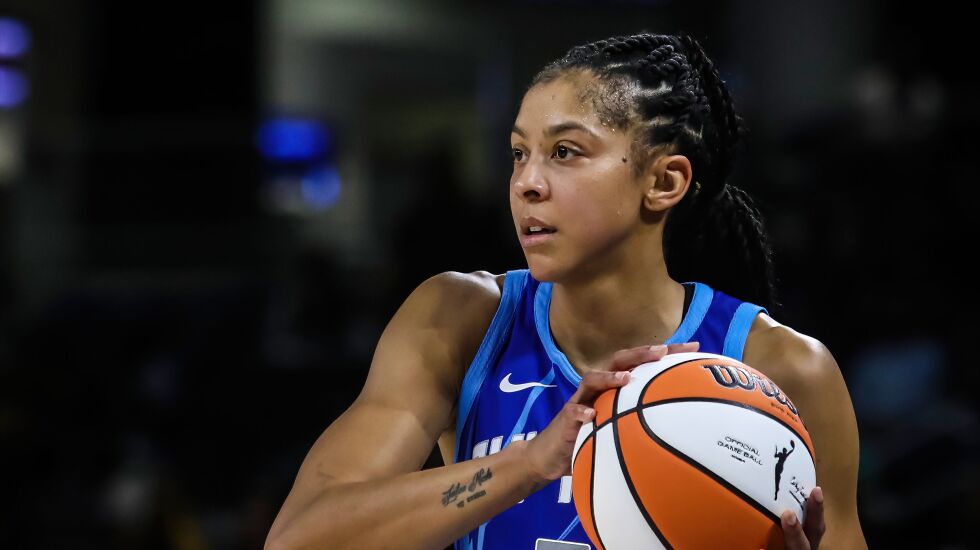
Candace Parker didn’t hold back when the WNBA’s new prioritization rule came up during the Sky’s exit interviews.
She hasn’t played overseas since 2018, but when she did, those lucrative contracts are what paid for her house in Los Angeles and her daughter Lailaa’s private-school education, not the WNBA.
‘‘The WNBA was my summer job,’’ Parker said. ‘‘Playing overseas was my job, my main source of income, and I wouldn’t be able to do the things I’m doing today without that.’’
The new prioritization rule was negotiated as part of the WNBA’s collective-bargaining agreement, which expires after the 2027 season. In 2023, the rule will require all players with two or more years of experience to be in-market by the start of training camp or by May 1, whichever comes later. If players arrive late, they will be fined. If they miss the start of the regular season, they will be suspended for the year.
The rule becomes even more restrictive in 2024, requiring that all players arrive by the start or training camp or face suspension for that season.
Since the CBA was ratified in 2020, prioritization has been a looming topic. The impending enforcement of the rule has players across the league contemplating their options. Seven of the 10 players on the Sky’s final roster in 2022 will head overseas to compete for European clubs for the next eight months — all but Parker, Kahleah Copper and Allie Quigley.
Quigley opted not to compete overseas for the first time in 15 years, signaling her retirement might be approaching. After the toll the 2021-22 season took on Copper, winning WNBA Finals MVP and following it up with multiple MVP awards playing in Spain, she is choosing not to play overseas and will focus on rest.
Copper said during the Sky’s exit interviews that she will be working with the WNBA this offseason, but she didn’t specify in what capacity. The CBA includes additional cash compensation in offseason marketing agreements, with select players earning up to $300,000. That might be what Copper is tapping into.
Emma Meesseman is playing for Fenerbahce in Turkey after she wraps up competing in the World Cup for the Belgian national team. Meesseman thinks her team will be tightening its schedule to accommodate WNBA players’ return.
Meesseman thinks the prioritization rule is particularly unfriendly to international players who have limited time to spend with family. Her concern is that if Fenerbahce tightens its schedule, it will affect the already-short breaks she gets during her overseas season to return home to see family. During the WNBA season, Meesseman is unable to visit her family at all.
‘‘I have 10 days after my last game with the national team before I go to Turkey,’’ Meesseman said. ‘‘After the European season, I usually have 10 days, as well. Maybe two weeks ,if I’m lucky. [After prioritization], I won’t have that. It’s not possible.’’
Meesseman prioritizes the team she is with at the time, and right now that’s the Belgian national team. She won’t make a decision about playing in the WNBA in 2023 until free agency begins, but getting time with her family will be a heavy consideration for her.
One prominent agent in the league thinks the biggest issue facing players in 2023 as it pertains to prioritization is being fined for missing training camp. The 2023 WNBA season is expected to start May 19, allowing most players to play the entirety of their overseas season without facing suspension for missing the start of the regular season.
WNBA players competing in France will be up against a lengthier season that cuts into the WNBA’s. In those cases, agents are negotiating clauses in their clients’ contracts that would allow them to leave by an agreed-upon date.
Julie Allemand, who will compete for LDLC Asvel after competing with the Belgian national team at the World Cup, is the only member of the Sky’s 2022 roster who is signed to play with a French team.
Courtney Vandersloot has juggled a career overseas and in the WNBA since she was drafted by the Sky in 2011. She signed to play for Sopron in Hungary after five years playing for UMMC Ekaterinburg in Russia. She has spoken about the improvements to her game that have come as a result of playing year-round.
Her intention moving forward in the WNBA is to sign one-year deals and approach free agency weighing her options overseas.
‘‘I’m still holding out hope that the WNBA comes up with a solution because I don’t think we’re there yet,’’ Vandersloot said.
Parker’s biggest concern for the WNBA about prioritization is that it will cost it one of its star players, something she doesn’t think the league can afford to risk.
Commissioner Cathy Engelbert discussed the prioritization rule before the WNBA Finals series between the Aces and Sun, expressing her full support for the owners’ fight to get the rule established.
The trade-off for the prioritization rule was a steep increase in salaries, but they don’t begin to compare to what stars are making overseas. The super-max base salary in the WNBA is $228,094, but players such as the Storm’s Breanna Stewart are making upwards of seven figures overseas.
The league’s goal with the rule is for players to prioritize the WNBA. To accomplish that, the league must give them an adequate reason to do so. So far, it hasn’t.
‘‘I’m shying away from the [WNBA] because teams aren’t touching what I’m making in Europe,’’ Storm forward Gabby Williams said during her team’s exit interviews.







